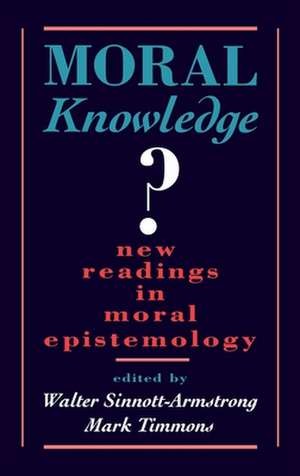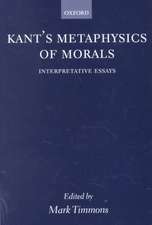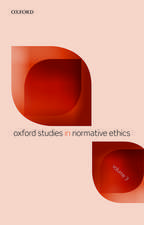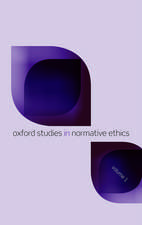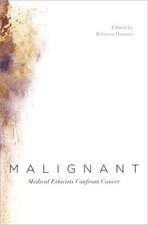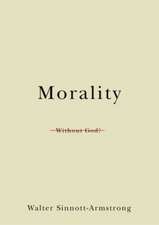Moral Knowledge?
Editat de Walter Sinnott-Armstrong, Mark Timmonsen Limba Engleză Hardback
The first chapter, written by Walter Sinnott-Armstrong, provides a framework for understanding the basic concepts and viewpoints in moral epistemology and presents a limited skeptical challenge to the justification of moral beliefs. The following essays represent various options in response to moral skepticism. Peter Railton and Simon Blackburn take different stances on moral truth and realism, Robert Audi defends a version of intuitionism, and Geoffrey Sayre-McCord adopts coherentism, while R.M. Hare combines elements of both foundationalism and coherentism. Richard Brandt discusses the relevance of empirical science to moral knowledge, Christopher Morris develops a contractarian account of moral justification, and David Copp bases moral knowledge on rational choices by societies. Margaret Urban Walker aruges for a feminist perspective on moral knowledge, and Mark Timmons expounds contextualism in moral epistemology.
The lively and clear selections do not presuppose specialized knowledge of philosophy, and the philosophical vocabulary used throughout the anthology is uniform, in order to facilitate understanding by those not familiar with the field. The first chapter includes a sustained critical discussion of the major views represented in the following chapters, thereby furnishing beginning students with appropriate background to understand the selections. The volume is further enhanced by an index and an extensive bibliography, which is divided into sections corresponding to the chapters of the book. Moral Knowledge provides the most up-to-date work on moral knowledge and justification and serves as an excellent text for undergraduate and graduate courses.
| Toate formatele și edițiile | Preț | Express |
|---|---|---|
| Paperback (1) | 424.98 lei 6-8 săpt. | |
| Oxford University Press – | 424.98 lei 6-8 săpt. | |
| Hardback (1) | 717.76 lei 6-8 săpt. | |
| Oxford University Press – | 717.76 lei 6-8 săpt. |
Preț: 717.76 lei
Preț vechi: 983.23 lei
-27% Nou
Puncte Express: 1077
Preț estimativ în valută:
137.35€ • 146.87$ • 114.51£
137.35€ • 146.87$ • 114.51£
Carte tipărită la comandă
Livrare economică 18 aprilie-02 mai
Preluare comenzi: 021 569.72.76
Specificații
ISBN-13: 9780195089882
ISBN-10: 019508988X
Pagini: 352
Dimensiuni: 162 x 242 x 22 mm
Greutate: 0.62 kg
Editura: Oxford University Press
ISBN-10: 019508988X
Pagini: 352
Dimensiuni: 162 x 242 x 22 mm
Greutate: 0.62 kg
Editura: Oxford University Press
Textul de pe ultima copertă
In Moral Knowledge? New Readings in Moral Epistemology, editors Walter Sinnott-Armstrong and Mark Timmons bring together eleven newly written essays by distinguished moral philosophers exploring the nature and possibility of moral knowledge. Each essay represents a major position within the exciting field of moral epistemology in which a proponent of the position presents and defends his or her view and locates it vis a vis competing views. The first chapter, written by Walter Sinnott-Armstrong, provides a framework for understanding the basic concepts and viewpoints in moral epistemology and presents a limited skeptical challenge to the justification of moral beliefs. The following essays represent various options in response to moral skepticism. Peter Railton and Simon Blackburn take different stances on moral truth and realism. Robert Audi defends a version of intuitionism, and Geoffrey Sayre-McCord adopts coherentism, while R. M. Hare combines elements of both foundationalism and coherentism. Richard Brandt discusses the relevance of empirical science to moral knowledge. Christopher Morris develops a contractarian account of moral justification, and David Copp bases moral knowledge on rational choices by societies. Margaret Urban Walker argues for a feminist perspective on moral knowledge, and Mark Timmons expounds contextualism in moral epistemology. The lively and clear selections do not presuppose specialized knowledge of philosophy, and the philosophical vocabulary used throughout the anthology is uniform, in order to facilitate understanding by those not familiar with the field. The first chapter includes a sustained critical discussion of the major views represented in thefollowing chapters, thereby furnishing beginning students with appropriate background to understand the selections. The volume is further enhanced by an index and an extensive bibliography, which is divided into sections corresponding to the chapters of the book. Moral Knowledge? provides the most up to date work on moral knowledge and justification and serves as an excellent text for undergraduate and graduate courses.
